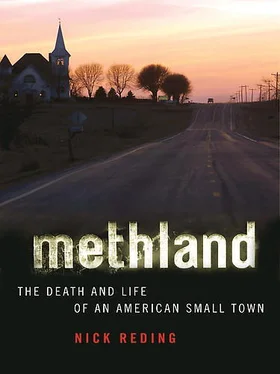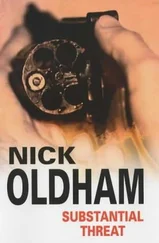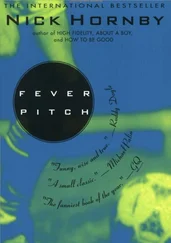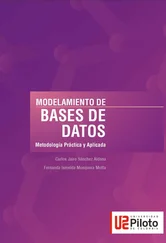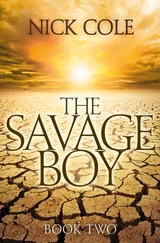I went to Independence in order to meet a recovering meth addict, his son, and his parents. I wanted to see the kind of generational effects about which Clay had spoken—the “multidimensional expansion of pathology,” as he put it, that a drug epidemic engenders. In trying to understand the difficulties caused by meth addiction in just one family, I felt it appropriate to go to In dependence, which is so much less rough around the edges than Oelwein. The lack of obvious corruption in In dependence made that town feel decades behind its neighbor to the north in terms of economic or drug-related complications, as though one might get a peek at what Oelwein had been like when Clay and Charlie Hallberg first started playing the bars back in the 1970s.
That a large-scale social ill infects individual lives and relationships is certainly not news. Indeed, I had already begun to appreciate the effects of Oelwein’s fate on Clay. Over more time, I’d see how the town’s difficulties seemed to accord with Clay’s growing abuse of alcohol. And while it’s not fair to say that social divisions directly split individuals, testing marriages and relationships, it seems reasonable to consider the added stress of a larger difficulty when looking at the various human pieces. What came into view in Independence was the inverse of this: once a community has shattered, not only will families splinter, too, but members will feel compelled to look for succor in surprising places. Meth doesn’t just drive people apart; it drives them together.
The recovering addict I’d come to speak with is known as Major to other members of the Sons of Silence motorcycle gang, or what he refers to as “the Family,” of which he is a former member. The name seemed appropriate, given the comparatively astounding effect Major had had within his fairly limited realm. Then twenty-five years old, Major lived with his parents, Bonnie and Joseph, in a pretty redbrick home on a quiet tree-lined street five blocks off Main. At six feet two, 180 pounds, Major had wide shoulders, sinewy arms, strong calves, and a slim waist. His natural blond hair and blue eyes must have served him well in the Family, for the Sons of Silence are an Aryan Nation organization, and Major has SS tattooed onto his left deltoid. Fourteen months ago, at the peak of his meth addiction, he weighed 130 pounds.
The day I went to meet Major, we sat on the porch of his parents’ house. Major had been clean for nine months by then, though he was still given to an addict’s hyperbolic monologues punctuated with firecracker explosions of laughter. I found him to be personable, self-deprecating, and funny, a kiss-ass and an intimidator, someone who would say what ever it took to get out of trouble. He was obviously highly intelligent and low on self-esteem, which made for a kind of cartoonish charm. Everything about him seemed to be in a state of contagious turmoil, the result, I guessed, of his years of brainwashing by the Sons of Silence. To witness the fights that raged in him—between meth and staying clean; between remaining with his blood-parents or returning to the Family; between self-loathing and self-aggrandizement—made it almost impossible not to sympathize with Major.
In northern Iowa, the Sons of Silence, once the foremost bike and drug gang, are today essentially a mom-and-pop meth-production outfit, making a few pounds of Nazi dope here and there, with access to a built-in retail force in the form of their few remaining riders. Their leader, a man named Bob, is the father of Major’s ex-girlfriend, Sarah. Sarah is the love of Major’s life and the mother of Major’s son, Buck. Bob, along with his wife and Sarah, lived on a farm in nearby Jesup, Iowa, where he continued to make meth. Bob’s presence just twelve miles away, along with the memory of the life that Major lived with him, was a weight that Major couldn’t seem to lift from the day-to-day drudgery of his sober existence.
At the time of my visit, Buck was two. He had white-blond hair, expressive dark blue eyes, and red lips that stood out against his rich, alabaster skin. His ruddy cheeks and already defined musculature seemed the marks of an older child. All around, in fact, Buck seemed developmentally ahead of the game for his age. He was personable and curious and talked a blue streak. He was anything but quiet, moody, and distant, often the marks of a so-called meth baby. And Buck is not just a meth baby, he is the meth baby of Iowa. When the Department of Human Services and local prosecutors, under the auspices of the Child in Need of Assistance (CHINA) statute, took him away from Major and Sarah, Buck’s hair had the highest cell-follicle traces of methamphetamine ever recorded in state history. Number two on the list was Buck’s half sister, Caroline, who was six at the time she was taken.
From where Major and I sat at a table on the porch, Major looked at his mother, who was inside the screen door, listening to our conversation. Buck was in the middle of yet another circumnavigation of the table via the four benches surrounding it. Major was clearly not going to say anything else while his mother was listening, and we all waited for several uncomfortable moments. I passed Buck over my lap so that he could go to the next bench, where, if his formula held true, he’d stop briefly to bang out a quick tune on the Tunnel Tuner—a plastic locomotive that whistles as it follows yellow tracks in a circle, one whistle per one push of a big blue button. Then he’d continue as before along his circular path.
“Mom,” said Major, “can you just not stand there, please?”
Major watched Bonnie leave the doorway and retreat into the kitchen. Then he said that in 2003 he and Bob developed a way to increase their yield from batching meth by microwaving the coffee filters through which they strained the dope’s impurities. Heating the filters yielded a good deal of powdered crank that had been absorbed by the paper. The problem was that the powdered crank also spread over the inside of the microwave, where Bob and Major cooked Buck and Caroline’s food, thereby permitting the children to ingest untold amounts of the drug.
The long-term effects of infant methamphetamine ingestion were unclear in 2005 when I met Major and Buck, and remain hazy today. Only one researcher, Dr. Rizwan Shah, of the Blank Children’s Hospital in Des Moines, has studied the problem for a significant period of time, twelve years, which is long enough to see trends but too short to track their continued effects. Buck did, said Major, exhibit some of the symptoms that Dr. Shah associates with children exposed to meth in the early years of their lives. Buck shook violently in the morning when he woke up, had trouble sleeping, and suffered from acute asthma. He was also quick to revert to violent anger as a form of communication and was maddeningly picky about his food, often refusing to eat. Whether these latter attributes were an indication that Buck was simply entering the terrible twos and beginning to exert his will or were related to his monumental exposure to meth was anyone’s guess. So far Buck didn’t seem affected by another common problem with meth exposure, which is an inability to interact with other human beings, a result, it is supposed, of long periods of frenetic, haphazard attention followed by days of lying helpless in a crib while parents sleep off their binges.
It’s meth’s long-term effects, though, that are potentially the most disturbing, in part because those effects are theoretical and based on observations made only among adults, many of whom suffer from liver and kidney failure, weakened hearts and lungs, high blood pressure, and severe anxiety. The worry is that whatever physical disabilities an adult suffers, a child, by definition weaker and smaller, will have these same deficiencies visited upon him manifold.
Читать дальше
